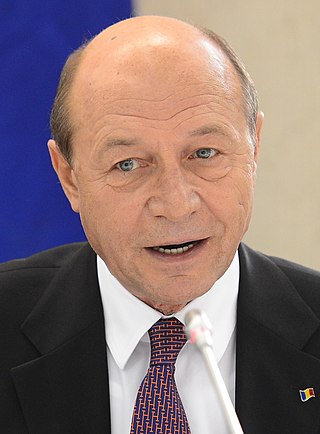
Traian Băsescu is a Romanian conservative politician who served as President of Romania from 2004 to 2014. Prior to his presidency, Băsescu served as Romanian Minister of Transport on multiple occasions between 1991 and 2000, and as Mayor of Bucharest from 2000 to 2004. Additionally, he was elected as leader of the Democratic Party (PD) in 2001.

George "Gigi" Becali is a Romanian businessman, writer and former politician and convict, mostly known for his ownership of the FCSB football club.
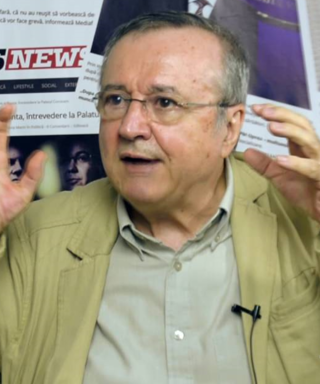
Ion Cristoiu is a conservative Romanian journalist and a controversial figure in the Romanian public due to his involvement as informant at Securitate. He was editor-in-chief of the daily Evenimentul Zilei during its heyday in the 1990s, when the average daily circulation topped 600,000, making it the most read newspaper in Romania, after “Romania Libera” and one of the most read in Eastern Europe as well. He also founded or played a major role at a number of the weekly publications during that era: Expres, Expres Magazin, and Zig-Zag. All these publications were highly critical of president Ion Iliescu.
Adevărul is a Romanian daily newspaper, based in Bucharest. Founded in Iași, in 1871, and reestablished in 1888, in Bucharest, it was the main left-wing press venue to be published during the Romanian Kingdom's existence, adopting an independent pro-democratic position, advocating land reform, and demanding universal suffrage. Under its successive editors Alexandru Beldiman and Constantin Mille, it became noted for its virulent criticism of King Carol I. This stance developed into a republican and socialist agenda, which made Adevărul clash with the Kingdom's authorities on several occasions. As innovative publications which set up several local and international records during the early 20th century, Adevărul and its sister daily Dimineața competed for the top position with the right-wing Universul before and throughout the interwar period. In 1920, Adevărul also began publishing its prestigious cultural supplement, Adevărul Literar și Artistic. By the 1930s, their anti-fascism and the Jewish ethnicity of their new owners made Adevărul and Dimineața the targets of negative campaigns in the far right press, and the antisemitic Octavian Goga cabinet banned both upon obtaining power in 1937. Adevărul was revived by Barbu Brănișteanu after World War II, but was targeted by Communist Romania's censorship apparatus and again closed down in 1951.
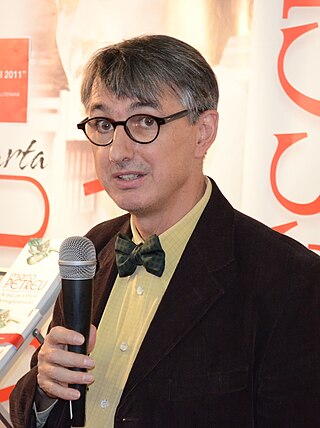
Horia-Roman Patapievici is a Romanian physicist and essayist who served as the head of the Romanian Cultural Institute from 2005 until August 2012. Between 2000 and 2005, he was a member of the National Council for the Study of the Securitate Archives, supporting more openness regarding the files of the Securitate.
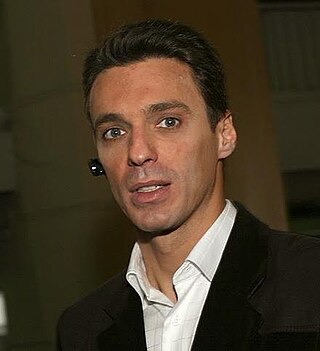
Mircea Radu Badea is a right-wing libertarian conservative Romanian political satirist, television host, media critic, radio personality and occasional actor. He is widely known as host of În gura presei a show based on the daily news, that airs on Antena 3.
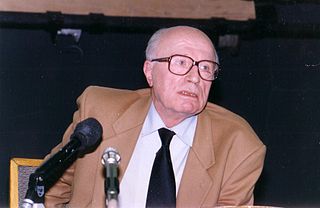
Virgil Ierunca was a Romanian literary critic, journalist, and poet. He was married to Monica Lovinescu.

Ioan Gyuri Pascu was a Romanian pop music singer, producer, actor, and comedian, also known for his participation in the comedy group Divertis and for his activity in Romanian cinema and television. Moving between rock music, rhythm and blues, reggae, and jazz, the multi-instrumentalist Pascu founded a number of bands and registered success particularly during the early 1990s, when he was the lead singer of a group known as The Blue Workers. Pascu was the manager of several alternative music acts with his label Tempo Music and remained an outspoken critic of Romanian commercial radio.
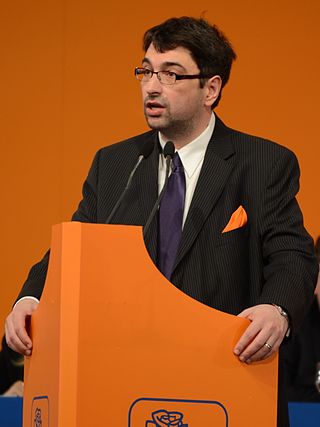
Sever Voinescu is a Romanian journalist, political analyst, diplomat and right-wing politician. A Foreign Affairs Ministry figure during the mid-1990s, he was later a Consul General of Romania in Chicago, United States. Voinescu became known as a columnist for Dilema Veche weekly and Cotidianul daily, and worked for the Institute for Public Policies, a political think tank. As pundit, Voinescu supports conservative ideas, and criticizes left-wing and welfare state solutions as applied to his country.

Elena Gabriela Udrea is a Romanian politician. An independent who held office while in the Democratic Liberal Party (PDL) and then the People's Movement Party (PMP), she was a member of the Romanian Chamber of Deputies from 2008 to 2016. In successive Emil Boc cabinets, she served as Tourism Minister from 2008 to 2009 and as Regional Development and Tourism Minister from 2009 to 2012. Sentenced to six years in prison for corruption offenses, she sought asylum in Costa Rica in 2018. The following year, she gave up the asylum claim and returned to Romania, where she is currently serving her sentence.
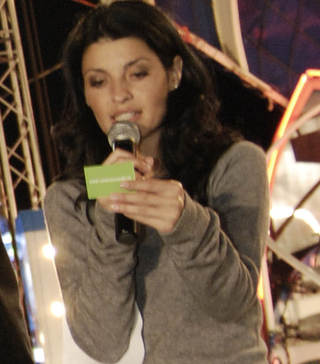
Marcela Lavinia Șandru is a Romanian politician, journalist and actress. The former president of the National Initiative Party (PIN), she was also vice president of the National Union for the Progress of Romania (UNPR). She was a member of the Romanian Chamber of Deputies for Mureș County from 2004 to 2008.

Cristian Diaconescu is a Romanian jurist and politician. He previously belonged to the National Union for the Progress of Romania (UNPR) and the Social Democratic Party (PSD), as well as to the People's Movement Party (PMP), which he led from 2021 to 2022. He sat in the Romanian Senate from 2004 to 2012, representing Constanța County from 2004 until 2008, and subsequently Bucharest. In the Adrian Năstase cabinet, he was Minister of Justice from March to December 2004; in the Emil Boc cabinet, he was Minister of Foreign Affairs between 2008 and 2009. He returned to the position in 2012, also under Boc, and continued in this capacity under Boc's successor, Mihai Răzvan Ungureanu.

Alina-Ștefania Gorghiu is a Romanian lawyer and politician who served as president of the National Liberal Party (PNL) from December 2014 until December 2016. She was a member of the Romanian Chamber of Deputies for Bucharest from December 2008 to December 2016. Since the latter date, she has represented Timiș County in the Romanian Senate.

Adrian Ursu is a Romanian journalist. Born in Slatina, he graduated from the Literature Faculty of the University of Bucharest in 1994, having been expelled from its Journalism Faculty the previous year. His journalistic work began in 1992, when he joined the staff of Adevărul newspaper. There, he reported on the activities of the Romanian Parliament, was an investigative journalist, and spent time as a war correspondent covering Iraq, Afghanistan and the former Yugoslavia. He advanced to become head of the politics department and assistant editor in chief before leaving the paper. From 2005 until December 2007, he was editor in chief of the new Gândul. In 2008, he joined Cotidianul's editorial council. Later that year, he became the newspaper's editor in chief, departing from that position in 2009 to become editorial director of Realitatea TV, and from the editorial council shortly thereafter when it was disbanded. He has produced shows on Romanian Television and Radio România Actualităţi, and co-hosted the daily talk show Ora de foc and the weekly Eurosceptici on Realitatea TV.

Presidential elections were held in Romania in 2014. They were the seventh presidential elections held in post-1989 Romania. In the first round of the elections on 2 November, the top two of the fourteen candidates qualified in a run-off on 16 November. These candidates were Victor Ponta, former Prime Minister and ex-leader of the Social Democratic Party (PSD) who won around 40% of the vote in the first round, and Klaus Iohannis, then mayor of Sibiu and leader of the Christian Liberal Alliance (ACL), who won around 30% in the first round respectively. Following large protests on how Ponta's government organized the elections in the diaspora, Klaus Iohannis staged a surprising come-back and won the run-off with 54.5%, or more than a million votes than his contender.
România TV is a 24-hour Romanian news television with conservative and nationalist orientation, launched on 23 October 2011 by former entrepreneur and politician Sebastian Ghiță. Its slogan is "We give the exact news!".

The Roșia Montană Protests were a series of protests in 2013 in Bucharest, Cluj-Napoca, Iași and dozens of other cities in Romania and abroad against the Roșia Montană mining project. Protesters said that the mining project would destroy the environment and heritage of Roșia Montană and demanded the withdrawal of a law which would enable this project to commence. In Bucharest, protests were held every evening in the University Square and marches were held each Sunday.

The 2012–2015 unrest in Romania refers to a prolonged period of civil unrest and political scandals in Romania, which took magnitude after the second half of the 2000s. The wave of civil demonstrations started in January 2012, once with the introduction of a new health reform legislation. The protests were fueled by the austerity measures applied in May 2010, but also by the unpopularity of Băsescu-backed Boc government. The demonstrations were characterized by widespread rioting and acts of vandalism. The political situation precipitated, so Prime Minister Emil Boc decided to step down on 6 February 2012.
Constantin Bălăceanu-Stolnici was a Romanian neurologist.
Diana Iovanovici Șoșoacă is a Romanian lawyer and far-right politician.
















